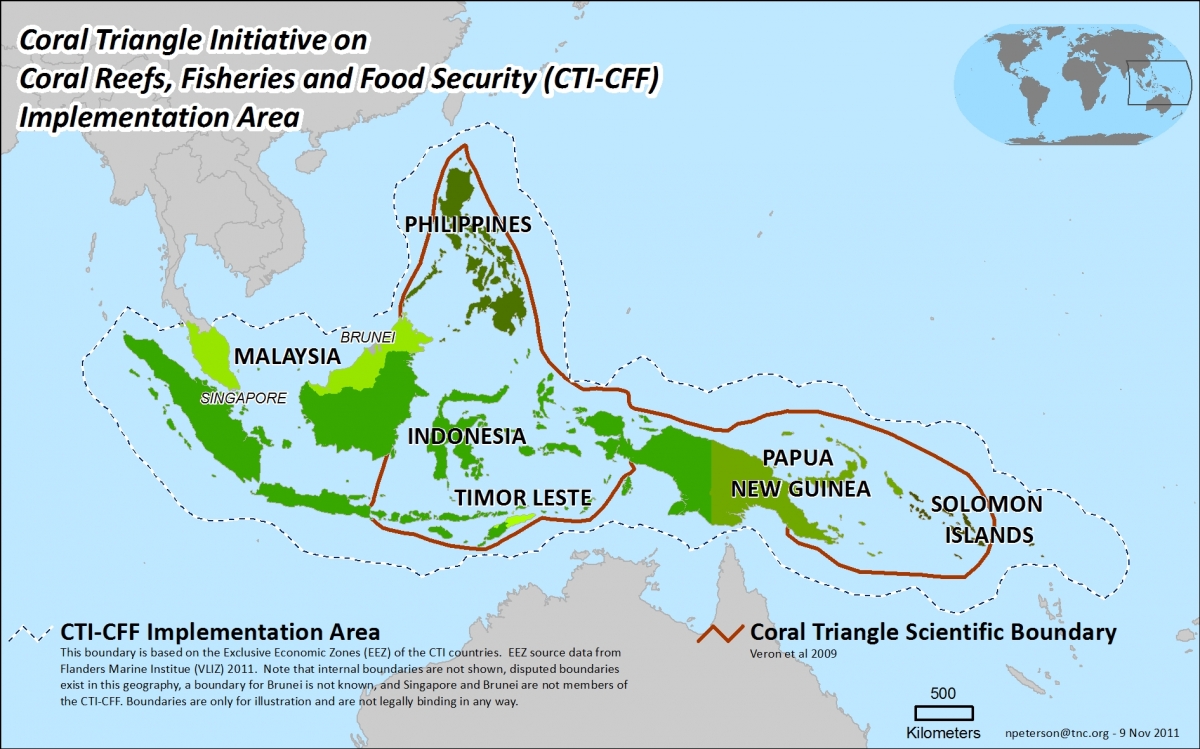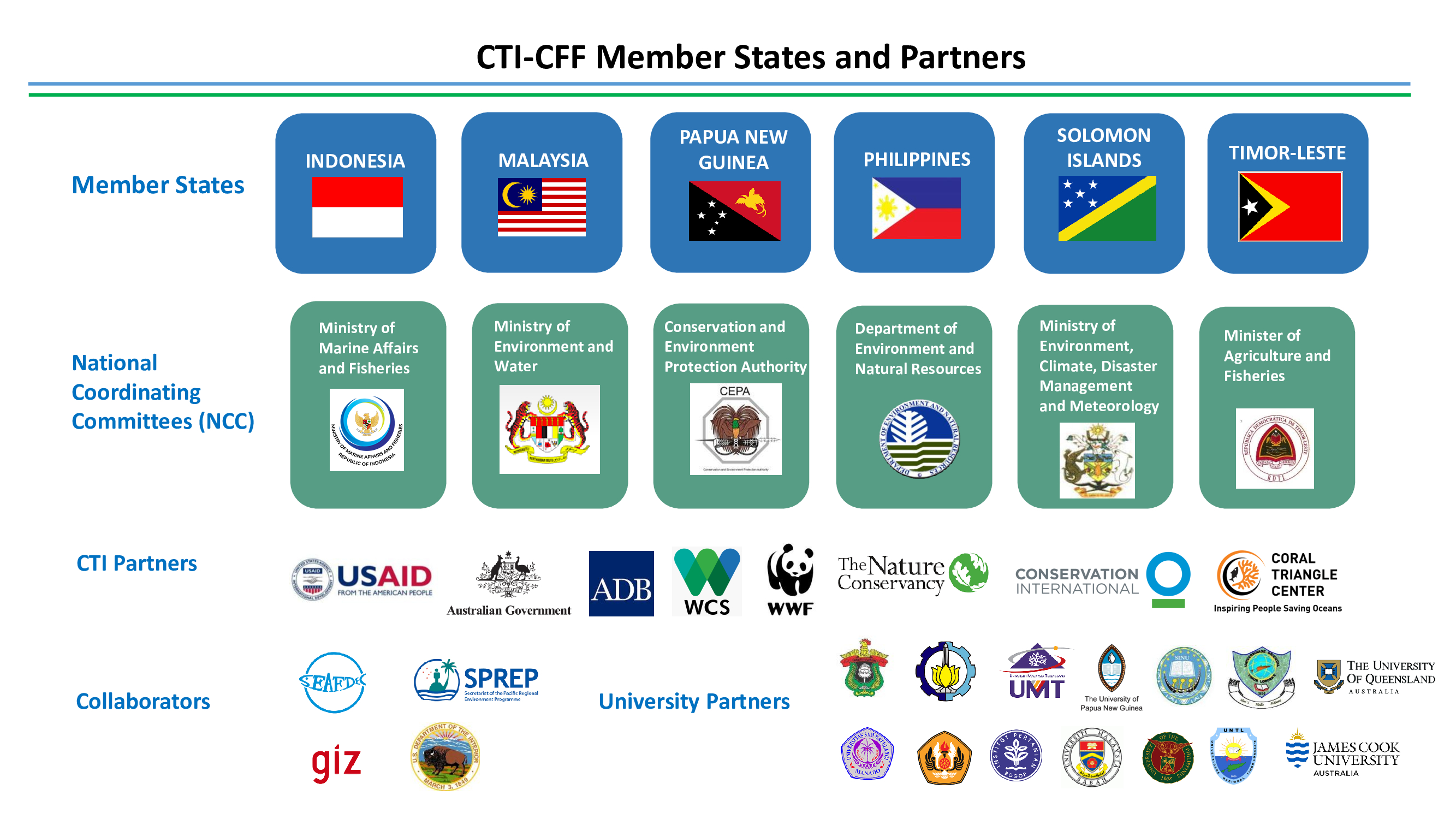About
History of CTI-CFF
The Coral Triangle Initiative on Coral Reefs, Fisheries, and Food Security (CTI-CFF) is a multilateral partnership of six countries working together to sustain extraordinary marine and coastal resources by addressing crucial issues such as food security, climate change, and marine biodiversity.
Recognizing the critical need to safeguard the region’s marine and coastal resources, in 2009, Indonesian President Yudhoyono inspired other leaders in the region to launch the Coral Triangle Initiative on Coral Reefs, Fisheries, and Food Security (CTI-CFF) through the signing of the Leaders Declaration.
It is the first multilateral cooperation of its kind, focusing on food security through sustainable management of marine natural resources, taking into consideration climate change impacts. The CTI-CFF was formed in 2009, and its members include the governments of Indonesia, Malaysia, Papua New Guinea, the Philippines, Solomon Islands, and Timor-Leste (the ‘CT6’) representing the custodians of the Coral Triangle area.

At the Leader’s Summit in 2009, these governments agreed to adopt a 10-year CTI-CFF Regional Plan of Action (CTI RPOA) to safeguard the region’s marine and coastal biological resources. The RPOA has five (5) goals: strengthening the management of seascapes; promoting an ecosystem approach to fisheries management; establishing and improving effective management of marine protected areas; improving coastal community resilience to climate change; and protecting threatened species.
Through the CTI-CFF, the Coral Triangle Member Parties have agreed to apply people-centered biodiversity conservation, sustainable development, poverty reduction, and equitable benefit sharing. The CTI-CFF seeks to address both poverty reduction through economic development, food security, sustainable livelihoods for coastal communities, and biodiversity conservation through the protection of species, habitats, and ecosystems.
Where we are
Despite their significant value, the coral reef ecosystems of the Coral Triangle are among the most threatened in the world. Approximately 95% are at risk. Overfishing has affected almost every reef in the region, destructive fishing practices are common, land-based pollution is significant, and coastal development is a growing threat. The future threats from climate change and ocean acidification will compound these problems. Working collaboratively with development partners, non-government organizations, and communities, the CTI achieved several milestones towards better management and conservation practices of these valuable ecosystems and resources.
CTI-CFF operates through five (5) Technical Working Groups, which mirrors the RPOA goals.
One of the CTI goals aims to establish a fully functioning and effectively managed region-wide Coral Triangle Marine Protected Area System (CTMPAS). Under the Marine Protected Areas (MPA) Working Group, significant progress has been made towards advancing common understanding of CTMPAS – how to improve management effectiveness and how to design and establish MPA networks.
The impacts of climate change are a real threat to the eyes of the CT6, and countries have developed a Region-wide Early Action Plan for Climate Change Adaptation (REAP) as the first deliverable of the CTI-CFF. The Plan requires, amongst others, putting in place effective adaptation measures for coastal communities and investing in the ability to conduct climate change vulnerability assessments and to plan for improving the resilience of coastal communities.
The Coral Triangle governments have also progressed toward the formal establishment of the CTI-CFF as a regional organization. At the CTI-CFF Ministerial Meeting in October 2011, the CT6 endorsed a suite of legal documents that guide the operations of the organization, including putting in place merit-based recruitment of staff, coordination procedures, and financial contributions to be borne by each country. This suite of foundational agreements allows a fully independent Regional Secretariat to coordinate the implementation of the CTI Regional Plan of Action.
The Regional Secretariat
All of the CT6 countries have ratified the “Agreement on the Establishment on the Regional Secretariat of the Coral Triangle Initiative on Coral Reefs, Fisheries, and Food Security (CTI-CFF),” which forms the foundation from which the Regional Secretariat shall operate.
The permanent Regional Secretariat was officially established with the appointment of the first Executive Director in April 2015, with the headquarters based in Manado, Indonesia. More on the Regional Secretariat here.
Registration with the United Nations Secretary General

In November 2017, the Agreement on the Regional Secretariat of the Coral Triangle Initiative on Coral Reefs, Fisheries, and Food Security was registered and recorded with the United Nations Secretary General, further increasing the profile of CTI-CFF on the international platform and opening the pathway for further possible cooperation with international bodies under the UN.
Way Forward
In order for CTI-CFF to be the leading organization in food security and marine resources management, continued support and commitment from Member Parties are paramount. This cooperation demonstrates the ability for governments to work together at the highest political level despite the inherent challenges of working with countries with differing institutional arrangements. The Coral Triangle countries are committed to continued action, nonetheless requiring much support from the international community to effect real change.

